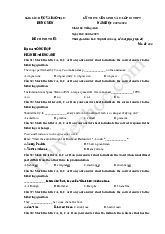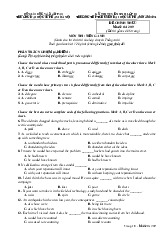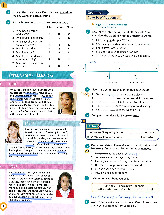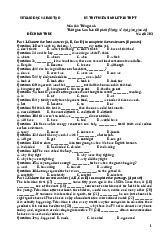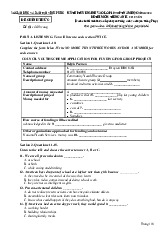



Preview text:
SỞ GIÁO DỤC VÀ ĐÀO TẠO
KỲ THI TUYỂN SINH VÀO LỚP 10 THPT QUẢNG BÌNH NĂM HỌC 2023-2024 Môn thi: Tiếng Anh Ngày thi: 07/06/2023
Thời gian làm bài: 60 phút ( không kể thời gian phát đề)
I. Điền vào mỗi chỗ trống một từ thích hợp ở trong khung đề hoàn thành đoạn văn sau. (1,5 đ) pollution country crowded producing find bring for
If you live in a city, you will probably see many people, hear the noise of traffic, and smell the
(1) _____________ from cars and factories. We are living in a new era in the history of the world.
Before this most people were fanners. They lived in small communities in the (2)_____________. Now
manypeople are leaving the farms and moving into the cities. They are looking (3)_____________
better jobs.As a result, the cities arc growing very quickly. Most cities are becoming more
(4)_____________. People are driving more cars, burning more fuel, using more water, eating more
food, making more garbage, and (5)_____________ morethings in factories than ever before. Life in
modem cities can(6)_____________ manyopportunities, but also many difficulties.
II. Đọc đoạn văn dưới đây và trả lời các câu hỏi. (1,0 đ)
Every child in Great Britain between the age of five and fifteen must attend school. There are
three main types of educational institutions: primary schools, secondary schools and universities.
State schools are free, and attendance is compulsory. Morning school begins at nine o'clock and lasts
until half past four. School is open five days a week. On Saturdays and Sundays there are no lessons.
There are holidays at Christmas. Easter and in summer. In London as in all cities there are two grades of
state schools for those who will go to work at fifteen: primary schools for boys and girls between the
ages of five and eleven, and secondary schools for children from eleven to fifteen years.
The lessons are reading, writing, the English language. English literature. English history,
geography, science. Nature study, drawing, painting, singing, woodwork and drill.
7.What are three main types of educational institutions?
🡪 ______________________________________________________________________________
8.What time does morning school begin?
🡪 ______________________________________________________________________________
9.Is school open five days a week?
🡪 ______________________________________________________________________________
10.When do pupils have holidays?
🡪 ______________________________________________________________________________
III. Chọn đáp án đúng trong số A, B, C hoặc D để hoàn thành các câu sau. (2,0 đ)
11.Mary often watches television after dinner, _____________?
A. doesn’t she B. did she C. does she D. didn't she
12.Mary speaks English_____________ than her brother.
A. more fluent B. fluent C. more fluently D. fluently
13.The material and design of clothes for men are different_____________ those for women. A. with B. of C. in D. from
14.The hat_____________ my mother gave me on my birthday is very beautiful.
A. who B. which C. whose D. whom
15.Due to the bad weather, the flight to Ha Noi was _____________.
A. put off B. taken off C. cut down D. turned down
16. Peter and David are talking about the way to save electricity.
- Peter:think we should use energy-saving bulbs to save electricity.” – David: “_____________”
A. Great! Don’t do that B. Well done! Trang 1
C. Good but I don’t want to. D. That’s a good idea.
17. My father works in a big company with high salary and he is the _____________ of my
family.Mother stays at home and does the housework.
A. tutor B. breadwinner C. facilitator D. adviser
18. I am_____________ that people have spoiled this area.
A. disappointing B. disappointment C. disappointed D. disappoint
IV. Chọn từ trong số A, B, C hoặc D có phần gạch chân được phát âm khác với phần gạch chân
của những từ còn lại. (0,5 đ)
19. A. hour B.hand C. home D.hat
20. A. study B. husband C. humour D. custom
V. Chọn từ trong số A, B, C hoặc D có trọng âm chính rơi vào vị trí khác so với các từ còn lại.(0,5 đ).
21.A. consider B. develop C. embroider D. understand
22. A. money B. machine C. water D. student
VI. Biến đổi từ trong ngoặc ở dạng đúng để hoàn thành các câu sau. (0,5 đ)
23.This coat is nice and___________ so I really like wearing it.(COMFORT)
24.Theyhad a happy___________ together when they were little kids.(CHILD)
VII. Viết lại các câu sau bắt đầu bằng từ hoặc cụm từ cho sẵn sao cho nghĩa của câu không thay đổi (1,5 đ)
25.Despite the difficult question, Linda solved it in two minutes. 🡪Although the
26.“I want to send my daughter to a university in Australia,” she said. 🡪She said that
27. I haven’t met my old teacher for 5 months. 🡪The last time I
VIII. Sửdụngcáctừvàcụmtừgợi ý đểviếtthànhcâuhoànchỉnh. (1,0 đ)
28. Last week, he/ suggest/ go/ Phong Nha cave / but/I/ be/ busy.
🡪 ______________________________________________________________________________
29.My mother/ be/ the person/ teach/ me/ first lesson on kindness.
🡪 ______________________________________________________________________________
IX. Sử dụng động từ trong ngoặc ở dạng hoặc thì đúng để hoàn thành cúc câu sau. (1,5 d)
30. When the phone rang last night, I (listen) ____________ to music.
31. I can’t buy that smartphone. I wish I (have) ____________ enough money to buy it.
32. It’s not easy (operate) ____________ this machine without the instructions.
33. If you (give)____________ her this gift, she would be happy.
34. Tim enjoys (play) ____________ volleyball in his free time.
35. Many trees (plant) ____________ in my school every year. HẾT
Thí sinh không được sử dụng tàỉ liệu.Cán bộ coi thi không giải thích gì thêm ĐÁP ÁN
I. Điền vào mỗi chỗ trống một từ thích hợp ở trong khung đề hoàn thành đoạn văn sau. (1,5 đ) pollution country crowded producing find bring for
If you live in a city, you will probably see many people, hear the noise of traffic, and smell the
(1) pollutionfrom cars and factories. We are living in a new era in the history of the world. Before this
most people were fanners. They lived in small communities in the (2)country. Now manypeople are
leaving the farms and moving into the cities. They are looking (3)forbetter jobs.As a result, the cities
arc growing very quickly. Most cities are becoming more (4)crowded. People are driving more cars, Trang 2
burning more fuel, using more water, eating more food, making more garbage, and
(5)producingmorethings in factories than ever before. Life in modem cities
can(6)bringmanyopportunities, but also many difficulties.
II. Đọc đoạn văn dưới đây và trả lời các câu hỏi. (1,0 đ)
Every child in Great Britain between the age of five and fifteen must attend school. There are
three main types of educational institutions: primary schools, secondary schools and universities.
State schools are free, and attendance is compulsory. Morning school begins at nine o'clock and lasts
until half past four. School is open five days a week. On Saturdays and Sundays there are no lessons.
There are holidays at Christmas. Easter and in summer. In London as in all cities there are two grades of
state schools for those who will go to work at fifteen: primary schools for boys and girls between the
ages of five and eleven, and secondary schools for children from eleven to fifteen years.
The lessons are reading, writing, the English language. English literature. English history,
geography, science. Nature study, drawing, painting, singing, woodwork and drill.
7.What are three main types of educational institutions?
🡪Primary schools, secondary schools, universities
8.What time does morning school begin? 🡪At nine o'clock
9.Is school open five days a week? 🡪Yes, it is
10.When do pupils have holidays?
🡪At Christmas, Easter and in summer
III. Chọn đáp án đúng trong số A, B, C hoặc D để hoàn thành các câu sau. (2,0 đ)
11.Mary often watches television after dinner, _____________?
A. doesn’t she B. did she C. does she D. didn't she
12.Mary speaks English_____________ than her brother.
A. more fluent B. fluent C. more fluently D. fluently
13.The material and design of clothes for men are different_____________ those for women.
A. with B. of C. in D. from
14.The hat_____________ my mother gave me on my birthday is very beautiful.
A. who B. which C. whose D. whom
15.Due to the bad weather, the flight to Ha Noi was _____________.
A. put off B. taken off C. cut down D. turned down
16. Peter and David are talking about the way to save electricity.
- Peter:think we should use energy-saving bulbs to save electricity.” – David: “_____________”
A. Great! Don’t do that B. Well done!
C. Good but I don’t want to. D. That’s a good idea.
17. My father works in a big company with high salary and he is the _____________ of my
family.Mother stays at home and does the housework.
A. tutor B. breadwinner C. facilitator D. adviser
18. I am_____________ that people have spoiled this area.
A. disappointing B. disappointment C. disappointed D. disappoint
IV.Chọn từ trong số A, B, Choặc D có phần gạch chân được phát âm khác với phần gạch chân
của những từ còn lại. (0,5 đ)
19.A. hour B.hand C. home D.hat
20. A. study B. husband C. humour D. custom
V. Chọntừtrongsố A, B, Choặc D cótrọngâmchínhrơivàovịtríkhác so vớicáctừcònlại.(0,5 đ).
21.A. con’sider B. de’velop C. em’broider D. under’stand
22. A. ‘money B. ma’chine C. ‘water D. ‘student Trang 3
VI. Biến đổi từ trong ngoặc ở dạng đúng để hoàn thành các câu sau. (0,5 đ)
23.This coat is nice and comfortable so I really like wearing it.(COMFORT)
24.Theyhad a happy childhood together when they were little kids.(CHILD)
VII. Viết lại các câu sau bắt đầu bằng từ hoặc cụm từ cho sẵn sao cho nghĩa của câu không thay đổi (1,5 đ)
25.Despite the difficult question, Linda solved it in two minutes.
🡪Although the question was difficult, Linda solved it in two minutes.
26.“I want to send my daughter to a university in Australia,” she said.
🡪She said that she wanted to send her daughter to a university in Australia.
27. I haven’t met my old teacher for 5 months.
🡪The last time I met my old teacher was 5 months ago.
VIII. Sử dụng các từ và cụm từ gợi ý để viết thành câu hoàn chỉnh. (1,0 đ)
28. Last week, he/ suggest/ go/ Phong Nha cave / but/I/ be/ busy.
🡪Last week, he suggested going to Phong Nha cave but I was busy.
29.My mother/ be/ the person/ teach/ me/ first lesson on kindness.
🡪My mother is the person who taught me the first lesson on kindness.
IX. Sử dụng động từ trong ngoặc ở dạng hoặc thì đúng để hoàn thành cúc câu sau. (1,5 d)
30. When the phone rang last night, I (listen) was listeningto music.
31. I can’t buy that smartphone. I wish I (have) hadenough money to buy it.
32. It’s not easy (operate) to operatethis machine without the instructions.
33. If you (give)gaveher this gift, she would be happy.
34. Tim enjoys (play) playingvolleyball in his free time.
35. Many trees (plant) are plantedin my school every year. HẾT
Thí sinh không được sử dụng tàỉ liệu.Cán bộ coi thi không giải thích gì thêm. Trang 4
